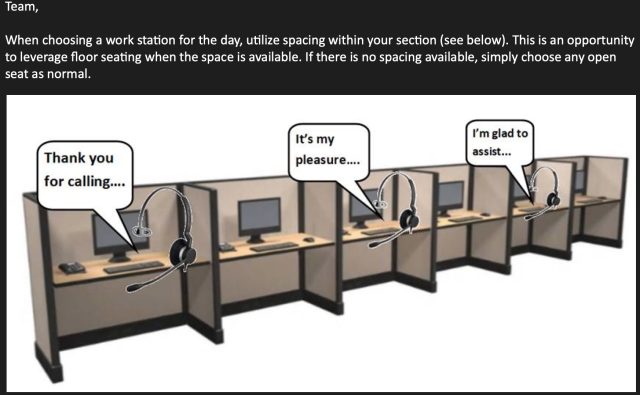
Charter employees are angry at the cable company for refusing requests to work from home during the coronavirus pandemic and have been reaching out to Ars this week to complain about their employer.
One Charter employee who works in a 24-hour call center in a suburb of Orlando, Florida, said the facility has anywhere between 400 and 700 employees working in one large room at any given time. The call center has 1,200 agents in total, the employee told us yesterday. Instead of letting call-center agents work from home, Charter is advising employees to work at every other desk, leaving a buffer of one empty desk between employees. But there isn’t enough space or enough desks to do that, the employee said.
“This is the rough part: we sit at a different desk every day,” the employee said. “We don’t have our own desks. It’s an absolute nightmare breeding ground for germs on a normal basis.” The employee shared this graphic from an email that was sent to the call-center workers:

“Everyone is very concerned,” the employee said. “Attendance is down, attrition is up, people are leaving.” Making matters worse, the employee said that Charter penalizes and even fires employees for calling out sick repeatedly.
“The attendance policy is extremely vague and leaves a lot to discretion at the supervisory level,” the employee said. “The official wording is something like two absences in a month constitutes a pattern, which is grounds for corrective action.”
Employees test positive
Other employees say that several Charter workers in different states have tested positive for COVID-19, according to a TechCrunch article yesterday.
One of those positive tests was at a facility in Charlotte, North Carolina. We talked to an employee at that facility who told Ars that the building was shut down for a deep cleaning and disinfection. Employees at that building were told to work at home if they can, the employee told Ars. That building has at least 800 people on three floors, the employee said.
“It’s very close proximity with no risers or space [between workers],” the employee said. “It’s like these pods where there’s a guy in front of me, a guy on my left… it’s like eight people to a row [with] no type of separation at all.”
We asked Charter about the Charlotte facility, and the company told us that the building “was closed for deep cleaning and disinfection from Tuesday evening through this morning after we learned that an employee had undergone testing. Employees who have been in contact with the employee being tested are not reporting to work until the results are available and we know whether they need to self-quarantine.”
Another Charter facility in Austin, Texas, underwent a deep cleaning and disinfection “in accordance with CDC guidelines” after an employee reported symptoms on Friday, according to an internal memo seen by Ars.
Charter appears to be relenting somewhat but is still resisting a widespread work-from-home program. One employee forwarded us a memo sent by Charter CEO Tom Rutledge today, which said Charter is offering “an additional three weeks of flexible paid time to be used during 2020 for any reason related to COVID-19.” This could include an employee being sick themselves or needing to care for a sick child or family member. Employees must get approval from their manager to take this time off “so that we can ensure we get all of our required service done.”
The Charter memo also said the company is “developing further plans for increased social distancing,” including more space in facilities. The memo said that some employees will be allowed to work from home for a limited amount of time, but it was vague on details:
In addition, without endangering our obligation to provide critical services, we plan to give an option to some employees, who can be productive remote from the office, to work from home for a period of time. We will provide more information on this over the next week.
Charter confirmed the plan for three weeks of paid time off in a statement to Ars. “We are developing and implementing increased social distancing plans in our call centers and operations facilities,” Charter also told us. “And we will provide the option to work remotely to employees we believe can remain productive outside the office without endangering our obligation to provide critical services. These steps will enable our employees to continue providing essential communications services to 29 million customers, including institutions like hospitals, first responders and government facilities, which help flatten the curve and protect the country.”
CEO: Employees “more effective from the office”
On Tuesday, we wrote about a Charter engineer named Nick Wheeler who resigned instead of continuing to work in the office. Wheeler, who was based in Denver, complained about the rules against working from home and says that Charter management responded by accusing him of “inciting fear.”
Charter is the second-biggest cable company and Internet service provider in the United States, and it has about 95,000 employees. Rutledge last week told employees in a memo to keep coming to the office even if their jobs can be performed from home.
Rutledge’s memo, which was deleted from Charter’s website but is still available on the Internet Archive’s WayBack Machine, said that more than 80,000 of the company’s jobs “cannot be performed effectively from home.” These include “maintenance and construction technicians, customer service specialists, sales and retention professionals, supply chain, employees in network construction, operations, monitoring and field dispatch facilities with their associated support functions across Spectrum Residential, Business, Enterprise, Reach and Networks.”
Among those other 15,000 employees, “some back office and management functions can be performed remotely [but] they are more effective from the office,” Rutledge wrote. Employees should only stay home if they “are sick, or caring for someone who is sick,” Rutledge wrote.
As we noted in previous coverage, a source at Charter told us that one team of workers within the company’s customer operations division was given permission to work at home. But that decision was made just for one set of workers rather than for a large part of the company.